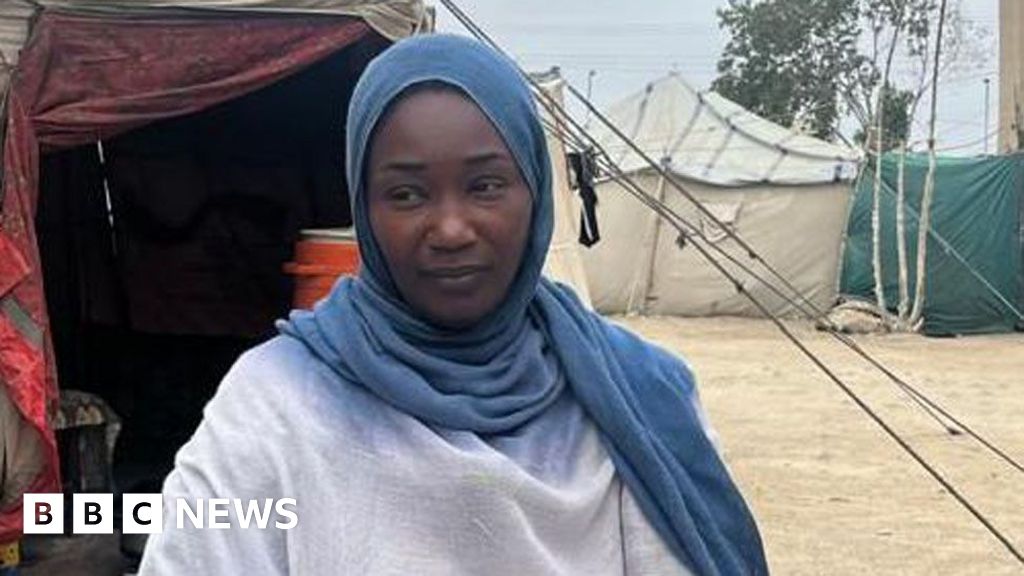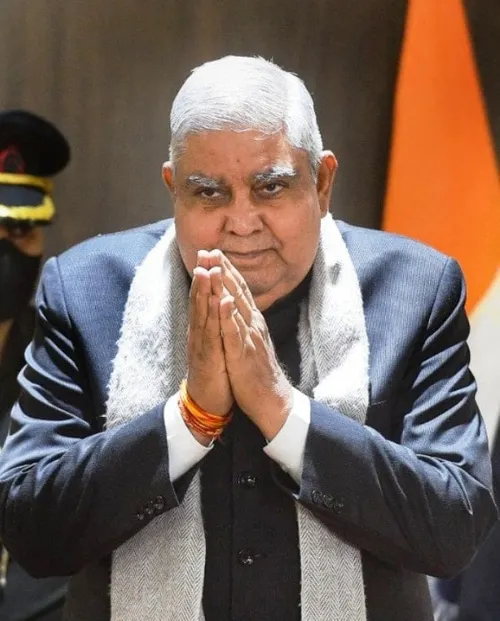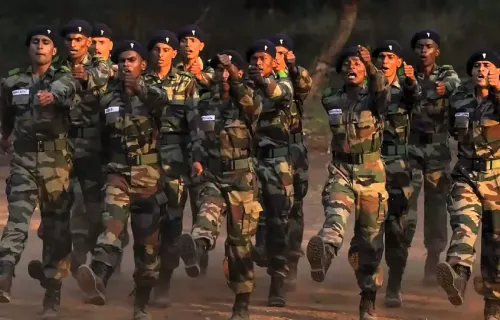BBC News Arabic & BBC News, Port Sudan & London
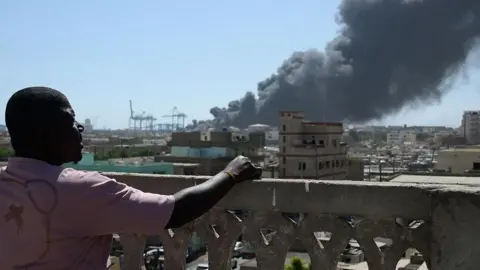 AFP / Getty Images
AFP / Getty ImagesA massive increase in the price of water is just one consequence of a week of aerial attacks on the Red Sea city of Port Sudan.
Once seen as a relatively safe haven from Sudan’s devastating civil war, Port Sudan is now reeling from days of bombardment from the Rapid Support Forces (RSF) paramilitary group.
After six days of drone attacks, smoke is still rising from three fuel depots which were targeted. Rescue teams are gathered around the destroyed sites, but they are struggling to put the fires out.
The conflict, which began as a struggle between the leaders of the RSF and the army more than two years ago, has created one of the world’s worst humanitarian crises and forced more than 12 million people from their homes.
One of those who fled to Port Sudan is 26-year-old Mutasim, who did not want his second name published for safety reasons.
The BBC spoke to him after he had waited hours for a water vendor to turn up.
The vital commodity has become scarce. The explosions at the fuel depots have left Port Sudan without the diesel used to power the pumps that bring up the groundwater.
Mutasim told the BBC that whereas a day’s supply of water cost him 2,000 Sudanese pounds ($3.30; £2.50) a week ago, he is now being charged five times that amount.
It leaves him and the seven other members of his family without much water for cooking, cleaning and bathing.
“Soon, we won’t be able to afford it,” he said explaining that he gets money from buying and selling basic goods in the market.
Water is not the only challenge in Port Sudan.
Daily life is going back to normal, markets and shops are open, but there are crowds of cars outside the city’s petrol stations as people desperately wait for fuel.
“It could take me five hours to get petrol,” said Mutasim.
It is a situation that many Sudanese have faced before, but not in this city.
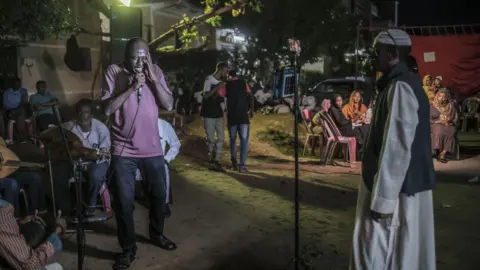 Bloomberg / Getty Images
Bloomberg / Getty ImagesUntil last week, Port Sudan was one of the few places in the country that was considered protected from the worst of the civil war.
“We came here two years ago from Omdurman,” Mutasim said, referring to the city that sits on the other side of the River Nile from the capital, Khartoum.
It cost the family their entire savings – $3,000 (£2,250) – to set up in a new place.
“We were forced to leave our home by the RSF, so it was a relief to come here. Life was starting to go back to normal.”
“We were thinking about moving because it is no longer safe here, but it’s so expensive – and where do we go?”
Port Sudan has been experiencing blackouts for the past two weeks, which have been made worse by the latest attacks.
“My auntie is over 70 years old, she is struggling with the heat and humidity because there is no electricity for fans at night,” Mutasim said.
“We can’t sleep.”
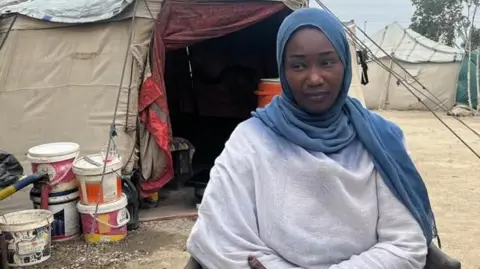
Hawa Mustafa, a teacher from el-Geneina in Darfur, in the west of the country, also sought refuge in Port Sudan.
She has been living with her four children in a shelter for displaced people for over two years. She said this week’s attacks left her “living in fear”.
“The drones came to us and we returned to a state of war and the lack of safety,” she told the BBC.
“The sounds of the drones and the anti-aircraft missiles remind me of the first days of the war in el-Geneina.”
Hawa lives without her husband, who has been unable to leave their home due to the deteriorating security situation. She is now responsible for her family.
“I don’t know where to go if things get worse in Port Sudan. I was planning to go to one of the neighbouring countries, but it seems that this dream will no longer come true.”
Another person living in the city, Mariam Atta, told the BBC that “life has changed completely”.
“We are struggling to cope,” she said. “The fear is constant.”
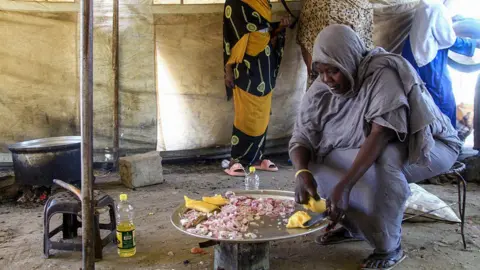 AFP / Getty Images
AFP / Getty ImagesSince Sudan’s civil war started in 2023, humanitarian agencies have depended on Port Sudan as a gateway to bring in aid, because of its port and the country’s only functional international airport.
It has been used by organisations such as the UN’s World Food Programme to deliver food assistance.
“Port Sudan is our main humanitarian hub,” says Leni Kinzli, WFP spokesperson for Sudan.
“In March, we had almost 20,000 metric tonnes of food distributed, and I would say definitely more than half of that came through Port Sudan,” she told the BBC.
The WFP has said that there is currently famine in 10 regions of the country, with 17 more at risk.
Many aid agencies are now concerned these attacks could block the flow of aid, making the humanitarian situation even worse.
“I think this is going to severely constrain the delivery of life-saving food and medical supplies, which will risk further deterioration of the already critical situation,” Shashwat Saraf, country director for the Norwegian Refugee Council, told the BBC.
He added that while agencies will look for other routes into the country, it will be challenging.
At night the city is quiet.
Before the attacks, people would gather at the coast and some would watch football in local cafes. But the electricity blackout has left the city in the dark and residents are choosing to stay at home for security reasons.
More BBC stories on the war in Sudan:
 Getty Images/BBC
Getty Images/BBCAnurag Dhole is a seasoned journalist and content writer with a passion for delivering timely, accurate, and engaging stories. With over 8 years of experience in digital media, she covers a wide range of topics—from breaking news and politics to business insights and cultural trends. Jane's writing style blends clarity with depth, aiming to inform and inspire readers in a fast-paced media landscape. When she’s not chasing stories, she’s likely reading investigative features or exploring local cafés for her next writing spot.
